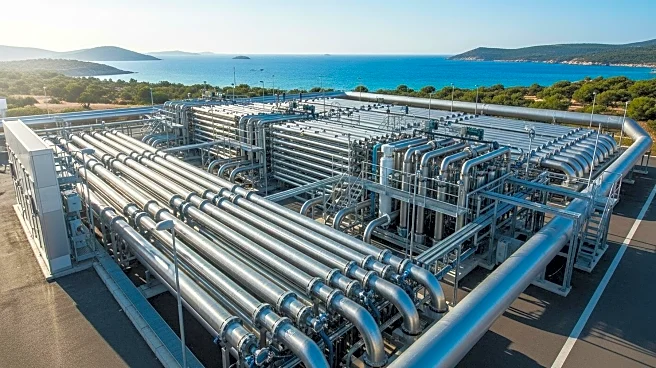What's Happening?
Recent studies and real-world monitoring have revealed that modern desalination techniques are effectively minimizing the environmental impact of brine discharge. Desalination, the process of converting seawater into freshwater, is increasingly vital for water-stressed regions. Despite concerns about environmental harm, particularly from brine discharge, scientific research and monitoring from projects in countries like Australia, Israel, the United States, and Chile show that when desalination is designed and operated with advanced engineering and rigorous regulation, the ecological impact is minimal. The brine discharge is rapidly diluted and localized, with no persistent biodiversity loss or pollutant accumulation. This development is crucial as global water demand is expected to rise by 55% by 2050, driven by population growth, industrialization, and climate change.
Why It's Important?
The significance of modern desalination lies in its ability to provide a sustainable solution to water scarcity, which affects over 2.3 billion people worldwide. As traditional water sources face immense strain, especially in arid regions, desalination offers a climate-resilient alternative that complements conservation and reuse strategies. The ability to produce high-quality water without compromising ocean health is essential for ensuring food security and livelihoods. By applying scientific rigor and adaptive management, desalination can be a cornerstone of water security, helping to mitigate the severe economic, social, and environmental consequences of depleting natural freshwater sources.
What's Next?
As the demand for freshwater continues to grow, further advancements in desalination technology and policy are expected. Continued investment in research and development will likely enhance the efficiency and environmental sustainability of desalination processes. Policymakers and environmental groups may focus on expanding desalination projects in water-scarce regions while ensuring strict regulatory frameworks to protect marine ecosystems. Collaboration between countries with successful desalination projects could lead to shared best practices and innovations, further improving global water security.
Beyond the Headlines
The broader implications of modern desalination include potential shifts in geopolitical dynamics, as countries with advanced desalination capabilities may gain strategic advantages in water-scarce regions. Additionally, the ethical considerations of balancing water security with environmental protection will continue to be a topic of discussion among stakeholders. Long-term, the integration of desalination with renewable energy sources could further reduce its environmental footprint, making it an even more attractive solution for sustainable development.









